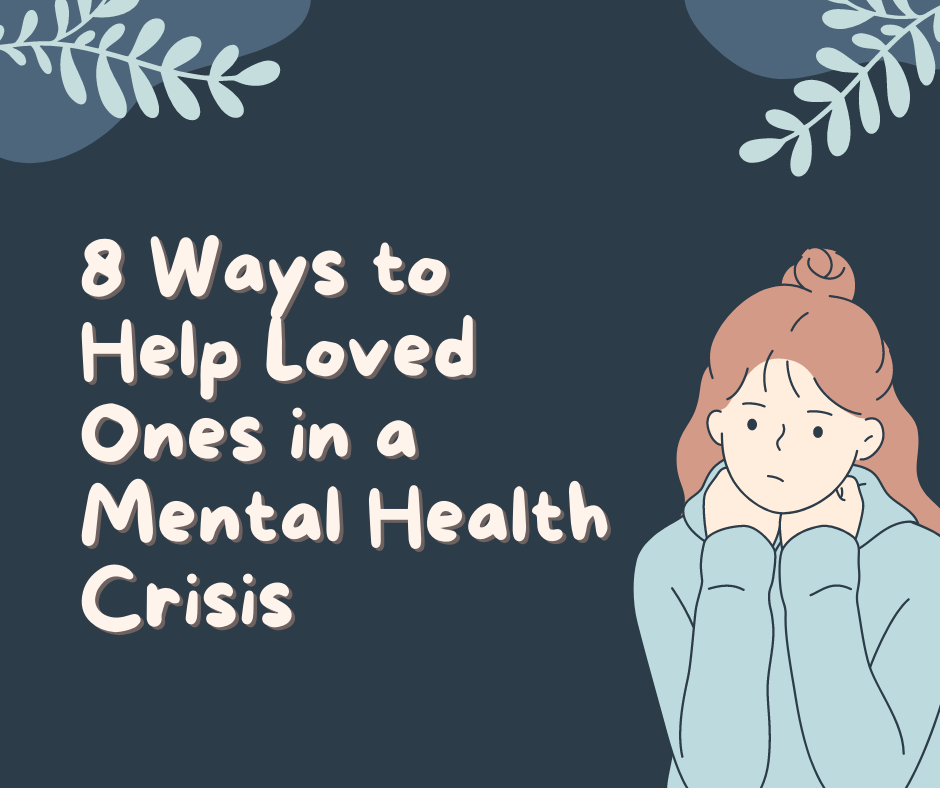

Seeing your loved one go through a mental health crisis? You feel helpless because you’re not too sure what to do that can ease their pain. Thankfully, there are many things you can do to help ease their suffering if you only learn to listen and dedicate your time to their recovery. We’ve listed the eight best tips to help your loved ones out a mental health crisis below.
1. Connect Them with Support People
Did you know that many people with mental health problems aren’t aware of how much help and support they can get from others? They can get so lost in their own thoughts and can become so convinced of their aloneness that they genuinely can’t see how much love the world can give.
With mental health cases on the rise, there are now many crisis counselors that are trained to help people in need. They can listen with compassion, give advice on how to calm down, train them in calming techniques like meditation, and so much more.
A quick Google check can pull up many hotlines for your loved one to call. For example, you can call 988 for The National Suicide and Crisis Lifeline, 1-866-488-7386 for The Trevor Project for LGBTQIA+ youth, and 877-565-8860 for the Trans Lifeline crisis hotline.
2. Give Them a Distraction
With so many negative thoughts floating around their head, your loved ones might appreciate a distraction to take their mind off things. This is especially helpful for those who want to offer a helping hand but don’t know how—some people just aren’t great at offering words of comfort.
There are many ways you can do this. You can offer to take them out on a date to unwind—bring them to a restaurant with yummy food, take them to a feel-good movie, do some fun activities like walking in the park, and more. Or you could just spend time with them at home by baking cookies, doing arts and crafts, or having a sleepover.
Make sure the activity is fun for them! Don’t just assume everyone enjoys the same thing.
3. Ask Them If They Need Anything
People with mental health problems already have a lot on their plate with their brains actively fighting against them. You can help alleviate some of their stresses by doing things for them. For example, if you notice that their house hasn’t been cleaned in a while or if they haven’t been eating healthily, you can offer to tidy up or take them out for a good meal.
You could also ask them point-blank if they need anything. You don’t know what your loved one is going through if they can mask their pain very well. This lets them know you’re there to give them the support they need.
4. Check Up on Them When They Feel Suicidal
Suicide is a very sensitive topic, but it needs to be brought up because it’s a matter of life and death. You really don’t want to regret not broaching the topic once something tragic happens. And don’t believe in the myth that talking about suicide only encourages suicide either. On the contrary, talking about suicide in the open reduces the likelihood of committing suicide and helps your loved ones understand how devastating their mental health crisis is.
Still, suicide is a grave topic, so tread lightly. Be gentle when you ask if they’ve ever contemplated it. This lets them know you’re a safe person to talk to about suicidal thoughts and that you won’t judge them for it.
5. Listen and Validate Their Feelings
Sometimes, all people need is an ear. They don’t need people giving them unsolicited advice or coddling them; they just need a sounding board. You can be that person for them.
It’s easy to want to extend help even when people don’t want it, so make sure you ask them what they’d like first. Ask them if they need advice or just need an empathetic ear, then respond accordingly. Make sure to validate their feelings too by saying their response is totally normal, that you would have responded the same way, that it sucks they’re going through that, etc.
Additionally, you should always give them your undivided attention. People going through a mental health crisis already find it difficult to reach out to loved ones for help—don’t make them regret their decision by being blasé or uncaring about their ordeals. Prioritize their needs.
6. Recommend Therapists
Nobody should be embarrassed about seeing a therapist. These professionals can help dissect your feelings and make you feel more at peace about them. So, if your loved one doesn’t already have one, encourage them to sign up for therapy sessions. You could even offer to help them find great ones in your area that accept their insurance, are close to their home or workplace, and more.
On top of that, you can make things easier for them during their therapy sessions. You can maybe drive them to and from sessions. You can also offer to babysit so they don’t have to worry about childcare. Whatever it takes to make things easier for them.
If they already have a therapist, remind them that the option is always open for them to see their therapist.
7. Stay in Touch
Knowing that there are loved ones to reach out to when they need help is comforting to people going through a mental health crisis. So, if your loved one looks like they need a companion, let them know you’re available. Don’t force yourself though—pushing them to share things with you when they’re not ready or are unwilling will only push them away. You need to let them come to you.
You don’t need to do anything special. Even a quick phone call will be enough to remind them of your presence.
You can also encourage other people to check up on them too. Having more support people is always great, but make sure you’re not gossiping about your loved one or oversharing. Don’t share things that are meant to be kept secret, and don’t tell people that aren’t that close to your loved one.
8. Call Services When Needed
Some things are out of your control when it comes to a suicidal loved one. For example, if they’ve already hurt themselves, it’s best to leave things to medical professionals in case they need to treat any wounds or flush out any attempted overdoses. However, only do this when the situation is dire—oftentimes, hospitals or emergency rooms aren’t great at handling mental health episodes.
Calling the police can also be a hit or miss. They’re great at finding missing people, but when it comes to handling episodes, they’re also not great. They can even be traumatic or deadly for people of color—this will only exacerbate their mental health problems.
Your first call should always be to a mobile crisis intervention unit or hotline. They’re trained at handling a mental health crisis and can calm your loved ones before things go bad. They can also accompany your loved one while they seek the help they need.


